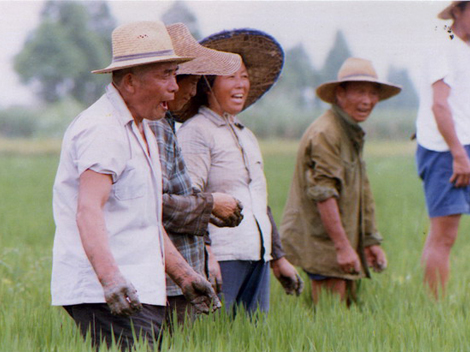
Of all farming songs, those boasting the most unique aria mainly come from Liantang, Zhaoxiang, Jinze, Shangta and Zhujiajiao Towns of Qingpu District in Shanghai. In the meantime, they are further developed and well-received in Songjiang, Jinshan and Fengxian Districts. Rice is cultivated in all these regions. Farming songs have also been spread to neighboring places in other provinces, specifically, Wujiang of Jiangsu Province and Jiashan of Zhejiang Province.
In Qingpu District, while weeding and loosening the soil in the rice fields, farmers will sing alternately, after a leading singer takes the initiative. The farming song of Qingpu is also called Bawling Folk Song, Luoyang Song (literally, the song of transplanting rice seedlings) and Datou (literally a big head) Folk Song. Prevailing mainly in Zhaoxiang and Liantang of Qingpu District, it is known for its unique form of performance. The Bawling Folk Song of Zhaoxiang is performed in the form of several stages, including Touge (the starting note), Qianmai (the transitional note in the early period), Qianliao (empty words sung following the previous lines, also in the early period), Fachangsheng (letting out a long cry), Ganlaoya (chorus), Houmai (the transitional note in the late period), Houliao (empty words sung following the previous lines, also in the late period) and finally Xiesheng (the concluding note).
Lyrics of the farming song of Qingpu originate in and also reflect the daily life. Rich and colorful, they not only educate people by enhancing their understanding of the society, but also serve as entertainment. Besides, they are abundant in aesthetic value. Concerning varied aspects such as labor, life, thought and love, the farming song of Qingpu is of great significance for studying social life and folk customs in Qingpu and the surrounding areas where rice is cultivated.
The farming song of Qingpu boasts unique musical characteristics. With a resounding tone and substantial fluctuations in rhythm, the song often proceeds with octave jumps, as well as quint and tierce jumps. Moreover, the farming song is performed in a free measure, thus giving rise to a large amount of complementary accompaniment. The song is basically organized in a monophonic pattern. However, when one phrase is jointed with another, the latter usually intrudes upon the concluding note of the former one. Overlapping of the two phrases thus comes into being, which is called "rising one after another" by folk singers. During the song, overlapping of two successive phrases will lead to harmony of tones between two voice parts, thus engendering special factors of multiple voice parts. As a labor song created by laboring people themselves, the farming song not only expresses their feelings, including happiness and agony, but also cultivates the mind and alleviates fatigue. Therefore, the farming song is extensively popular in Qingpu District. Hitherto it has been passed down from generation to generation in the countryside.





